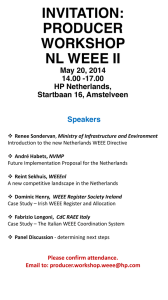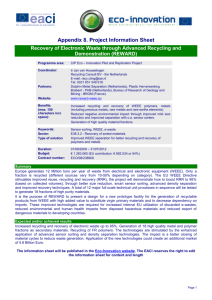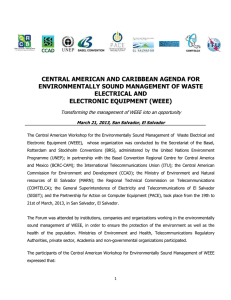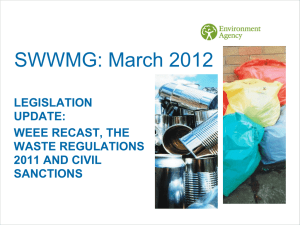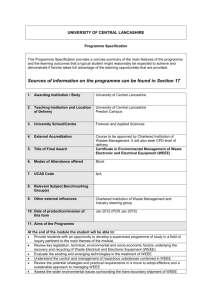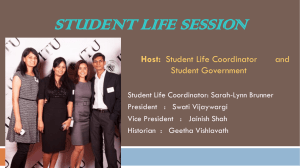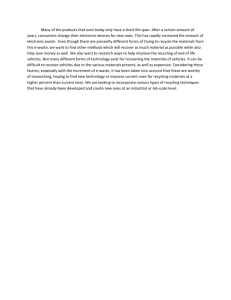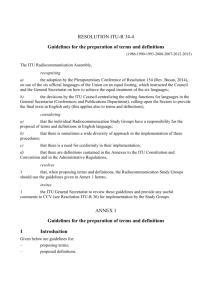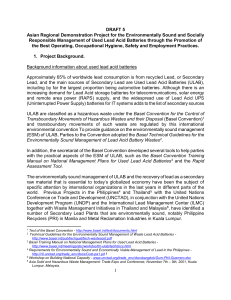ANNEX Provisional programme
advertisement
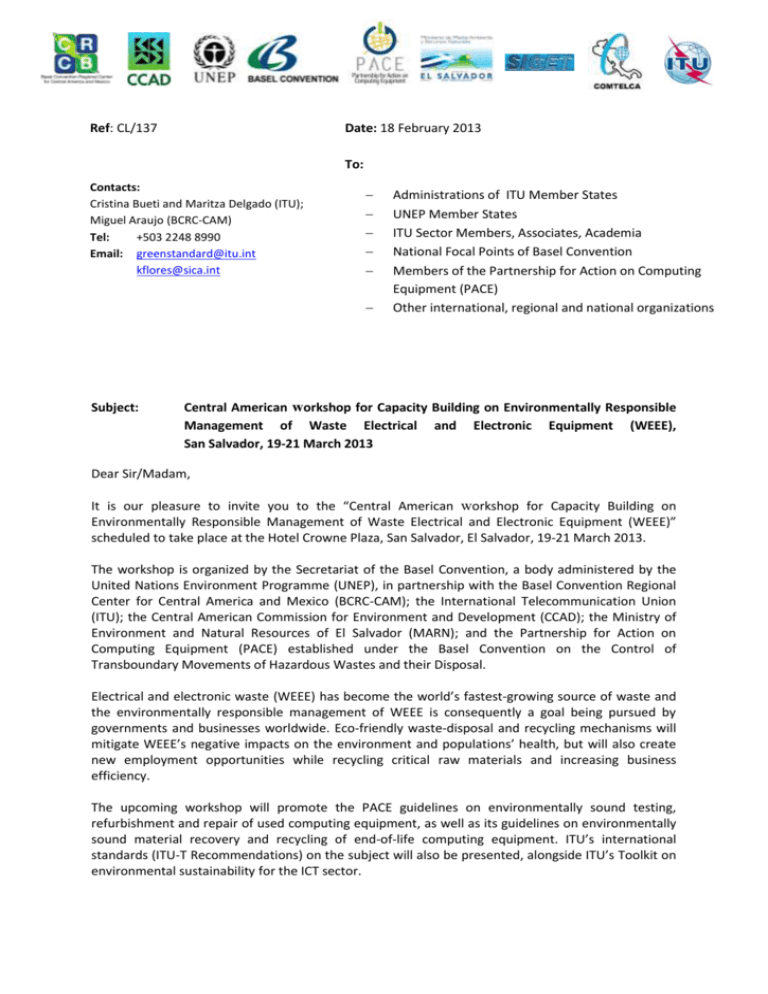
Ref: CL/137 Date: 18 February 2013 To: Contacts: Cristina Bueti and Maritza Delgado (ITU); Miguel Araujo (BCRC-CAM) Tel: +503 2248 8990 Email: greenstandard@itu.int kflores@sica.int Subject: Administrations of ITU Member States UNEP Member States ITU Sector Members, Associates, Academia National Focal Points of Basel Convention Members of the Partnership for Action on Computing Equipment (PACE) Other international, regional and national organizations Central American workshop for Capacity Building on Environmentally Responsible Management of Waste Electrical and Electronic Equipment (WEEE), San Salvador, 19-21 March 2013 Dear Sir/Madam, It is our pleasure to invite you to the “Central American workshop for Capacity Building on Environmentally Responsible Management of Waste Electrical and Electronic Equipment (WEEE)” scheduled to take place at the Hotel Crowne Plaza, San Salvador, El Salvador, 19-21 March 2013. The workshop is organized by the Secretariat of the Basel Convention, a body administered by the United Nations Environment Programme (UNEP), in partnership with the Basel Convention Regional Center for Central America and Mexico (BCRC-CAM); the International Telecommunication Union (ITU); the Central American Commission for Environment and Development (CCAD); the Ministry of Environment and Natural Resources of El Salvador (MARN); and the Partnership for Action on Computing Equipment (PACE) established under the Basel Convention on the Control of Transboundary Movements of Hazardous Wastes and their Disposal. Electrical and electronic waste (WEEE) has become the world’s fastest-growing source of waste and the environmentally responsible management of WEEE is consequently a goal being pursued by governments and businesses worldwide. Eco-friendly waste-disposal and recycling mechanisms will mitigate WEEE’s negative impacts on the environment and populations’ health, but will also create new employment opportunities while recycling critical raw materials and increasing business efficiency. The upcoming workshop will promote the PACE guidelines on environmentally sound testing, refurbishment and repair of used computing equipment, as well as its guidelines on environmentally sound material recovery and recycling of end-of-life computing equipment. ITU’s international standards (ITU-T Recommendations) on the subject will also be presented, alongside ITU’s Toolkit on environmental sustainability for the ICT sector. Given the technical nature of the event, the hosts would be most appreciative if participating organizations are represented at the workshop by experts in the field of electrical and electronic waste. The workshop’s provisional programme is available in the Annex. Confirmed workshop participants will receive further relevant information, including practical information on transfers from the airport and recommended accommodation. The workshop will be conducted in English and Spanish. More information on the event, including the provisional programme and an online registration form, can be found at: http://www.itu.int/en/ITU-T/climatechange/201303/Pages/default.aspx. Should you have any questions, please do not hesitate to contact Karina Flores de Castro or Flor de María Perla at the Basel Convention Regional Center for Central America and Mexico (E-mail: kflores@sica.int, fperla@sica.int, Tel: +503 2248 8990); or Cristina Bueti and Maritza Delgado at the International Telecommunication Union (E-mail: greenstandard@itu.int). Yours faithfully, [original signed] [original signed] Hamadoun I. Touré Secretary-General International Telecommunication Union Jim Willis Executive Secretary Secretariat of the Basel Convention Annex: 1 2 ANNEX Provisional programme Tuesday, 19 March 2013 08:00 - 8:30 Registration 08:30 - 8:45 Opening ceremony and opening remarks 9:00 - 10:30 Session 1 – Brief introduction of PACE guidelines, ITU’s documents, and BCRCCAM’s PACE Toolkit This session will provide basic information including objectives of the workshop, an introduction of PACE, ITU and BCRC-CAM, and the contents of the six guidelines or documents which were developed by the PACE project groups, ITU-T Recommendations, ITU’s Environmental Sustainability Toolkit and BCRC-CAM’s PACE Toolkit. 10:30 - 10:45 Coffee break 10:45 - 12:30 Session 2 Part 1 – ESM of Waste Electronic and Electric Equipment: advances and challenges This session will provide basic information on the current situation of WEEE, including some global analysis (based on StEP/UNEP document), country and subregional updates (including the ULAB Strategy for Central America, Mexico, the Caribbean, Mexico and Colombia) and how the national and sub-regional efforts should be coordinated. Furthermore, relevant experiences from outside the sub-region (e.g. Colombia and Peru) will be shared along with PACE “Environmentally Sound Management (ESM) Criteria Recommendations” as well as RELAC´s Guidelines for the Management of Waste Electrical and Electronic Equipment (WEEE) in Latin America. 12:30 - 13:30 Lunch 13:30 - 15:00 Session 2 Part 1 – ESM of Waste Electronic and Electric Equipment: advances and challenges (Continued) 15:00 – 15:15 Coffee break 15:15 - 17:00 Session 2 Part 2 - ESM of Waste Electronic and Electric Equipment: The role of policies and standards in E-waste management ITU will present, inter alia, ITU-T Recommendations related to e-waste management including its universal charger standard as well as the Toolkit on End of Life Management for ICT Equipment which is part of the ITU’s Environmental Sustainability Toolkit. This session will also discuss the importance of legal and regulatory frameworks on e-waste issues. 3 Wednesday, 20 March 2013 08:30 – 10:15 Session 3 – Reuse and Recycling of WEEE This session will present the two guidelines “Guideline on environmentally sound testing, refurbishment & repair of used computing equipment” and “Guideline on environmentally sound material recovery/recycling of end-of-life computing equipment”. In addition, this session will showcase experiences by countries of this sub-region, from international organizations (e.g. Salvadoran Center for Repair/Refurbishment of Computing Equipment, Recycling Centers in Asian countries, Acumuladores Iberia ULAB Recycling Plant in Guatemala) and will look at the issue of mobiles, office equipment and electric equipment in general. 10:15 – 10:30 Coffee break 10:30 - 12:00 Session 4 – Control of Transboundary Movements (TBM) of WEEE PACE’s “Guidance on Transboundary Movement (TBM) of Used and End-of-Life Computing Equipment” and status of illegal movements will be introduced. Information on preparation of electronically tracked TBM of ULAB will be shared. 12:00 - 13:00 Lunch break 13:00 – 15:00 Session 5 – National and Regional Strategies for ESM of WEEE El Salvador will share its National Strategy and Action Plan for ESM of WEEE, and the Executive Secretary of the Central American Commission on Environment and Development (CCAD), UNDP will present the project of the WEEE Partnership for Central America, which will support Nicaragua and Honduras, BCRC-CAM will present the road map for the formulation of the WEEE Central America Strategy and a proposal for its focus and content, experience of Costa Rica with its new law will be shared. 15:00 – 15:15 Coffee break 15:15 - 17:00 Session 5 – National and Regional Strategies for ESM of WEEE (Continued) Thursday, 21 March 2013 09:30 - 11:00 Session 7 – Dynamizing the Green Economy in Central America: Sub Regional Value Added Options for WEEE Repair/Refurbishment and Recycling Experienced international companies specialized in WEEE recycling, Original Equipment Manufacturers (OEM), governments representatives will share their experience in setting up these facilities and the viability of sub regional activities which may spur a green economy. Taking into consideration that governments are accountable for e-waste management, this session will also look at what are the options, business plans and other ways to deal with this problem. 11:00 - 11:30 Coffee break 11:30 - 12:30 Wrap up and closing of the training workshop 12:30 - 14:00 Lunch break 14:30 - 17:30 Technical visit to repair and refurbishing center _________________ 4
